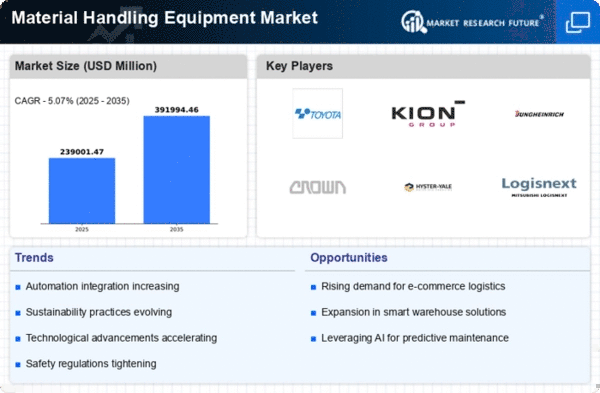Top Industry Leaders in the Material Handling Equipment Market
 The global material handling equipment market is a dynamic and vibrant space experiencing both fierce competition and exciting innovation. Players jockey for dominance, employing diverse strategies and adapting to a landscape shaped by megatrends like e-commerce and Industry. Delving into this intricate picture, let's explore the competitive landscape, market share drivers, key industry news, and noteworthy developments.
The global material handling equipment market is a dynamic and vibrant space experiencing both fierce competition and exciting innovation. Players jockey for dominance, employing diverse strategies and adapting to a landscape shaped by megatrends like e-commerce and Industry. Delving into this intricate picture, let's explore the competitive landscape, market share drivers, key industry news, and noteworthy developments.
Material Handling Equipment Market Strategies Shaping the Game:
-
Product Prowess: Established players like Toyota Material Handling, Kion Group, and Jungheinrich prioritize continuous product development, focusing on automation, electric powertrains, and ergonomic design. Startups like Fetch Robotics and Geek+ challenge with nimble innovation, bringing AI-powered robots and autonomous mobile platforms to the forefront. -
Diversification: Leading companies expand beyond traditional offerings, venturing into software solutions, warehouse management systems, and consulting services. This holistic approach aims to create integrated solutions and lock in customers through comprehensive packages. -
Regional Play: Market leaders invest heavily in establishing strong regional presences, particularly in emerging markets like China and India. This involves setting up manufacturing facilities, building distribution networks, and tailoring offerings to local needs. -
Sustainability Push: Environmental concerns are gaining traction, leading to a surge in demand for energy-efficient equipment and alternative power sources like lithium-ion batteries. Manufacturers highlight green credentials and offer eco-friendly solutions to attract environmentally conscious buyers. -
Partnerships and Acquisitions: Collaboration is key, with strategic partnerships and acquisitions forging synergies and accelerating technological advancements. Examples include Jungheinrich acquiring robotics specialist Magazino and Honeywell teaming up with Fetch Robotics for warehouse automation projects.
Factors Influencing Market Share:
-
Brand Reputation and Customer Service: Established brands with strong reputations and extensive service networks hold an edge, particularly in sectors like automotive and aerospace where reliability and uptime are paramount. -
Technological Expertise: Companies at the forefront of automation, AI, and connectivity solutions are poised to win, especially in the booming e-commerce and logistics sectors where efficiency and speed are crucial. -
Price and Cost-Effectiveness: Value-conscious buyers, especially in emerging markets, prioritize affordability and equipment with low operating costs. Manufacturers offering competitive pricing and attractive financing options stand to gain. -
Regional Demand and Infrastructure: Market dynamics vary significantly across regions. Companies with strong regional footprints and tailored solutions cater to specific needs, fostering market share growth. -
Sustainability Initiatives: As environmental regulations tighten and eco-consciousness rises, manufacturers with demonstrably green equipment and energy-efficient solutions gain a competitive edge.
Key Players
-
Liebherr Group (Switzerland)
-
KION Group AG (Germany)
-
Jungheinrich AG (Germany)
-
Viastore Systems GmbH (Germany)
-
Eisenmann AG (Germany)
-
Columbus McKinnon Corporation (U.S.)
-
Crown Equipment Corporation (U.S.)
-
Hytrol Conveyor Co., Inc. (U.S.)
-
Xuzhou Heavy Machinery Co., Ltd. (China)
-
Toyota Industries Corporation (Japan).
Recent Developments :
August 2023: Hyster-Yale Group unveils its new "Smart Lift" platform, providing real-time data and insights on forklift performance and operation.
September 2023: Mitsubishi Logisnext Europe and Jungheinrich form a strategic alliance to develop and market fuel cell-powered forklifts.
October 2023: Locus Robotics raises $150 million in funding to expand its autonomous mobile robot solutions for warehouses.
November 2023: The International Federation of Robotics reports a 25% increase in the global sales of industrial robots, with strong demand from the material handling sector.










